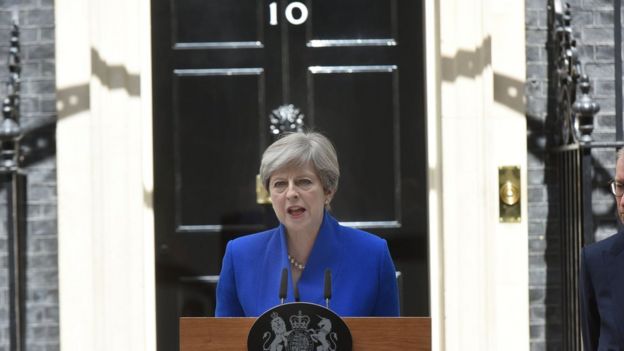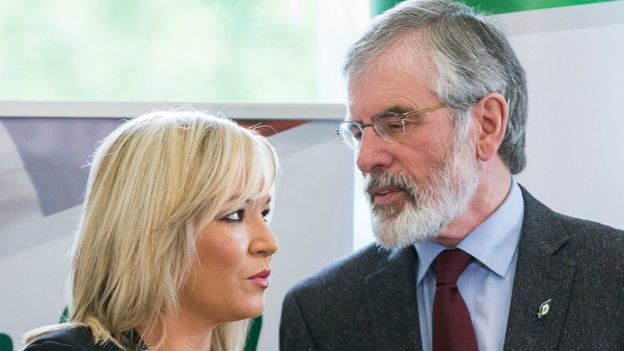General election 2017: DUP 'in positive talks' with Tories
Theresa May was left eight seats short of an overall majority in the general election, while the DUP won 10 seats.
Tory chief whip Gavin Williamson went to Belfast on Saturday for talks with the Northern Irish party.
The DUP said talks would continue next week to "work on the details" and "reach agreement".
A "confidence and supply" deal is not a full coalition, but an agreement which sees the smaller party support the larger one in key votes such as on the Budget.
Any agreement will come into force when Parliament returns next week.
No 10 had earlier said the DUP had agreed the principles of a deal and it would be discussed at a cabinet meeting on Monday.
- Live updates and rolling coverage
- Who are the DUP?
- Can a Conservative and DUP pact work?
- Q&A: What is a hung parliament?
A Downing Street spokesman said it "welcomed this commitment" from the DUP, but a later statement - released after midnight - suggested more talks would be necessary to finalise any deal.
"The prime minister has tonight spoken with the DUP to discuss finalising a confidence and supply deal when Parliament returns next week," it read.
"We will welcome any such deal being agreed, as it will provide the stability and certainty the whole country requires as we embark on Brexit and beyond.
"As and when details are finalised, both parties will put them forward."
In a DUP statement released at midnight, the party said: "The DUP held discussions with representatives of the Conservative Party in line with Arlene Foster's commitment to explore how we might bring stability to the nation at this time of great challenge.
"The talks so far have been positive."
'Profound implications'
In response to the earlier Downing Street statement, Liberal Democrat leader Tim Farron called on Mrs May to make the details of the deal public "immediately".
He said: "The actions of this government will have profound implications for the Brexit negotiations and the future of our country.
"At such a critical time, the prime minister must be clear with the people about the deal she has stitched up with the DUP behind closed doors."
Sinn Féin's leader in Northern Ireland Michelle O'Neill said the DUP had "betrayed the interests of the people" there.
She said: "They have achieved little propping up Tory governments in the past and put their own interests before those of the people.
"This new arrangement between the DUP and the Tories will be transitory and will end in tears."
Jeremy Corbyn said the government did not have any credibility to go forward and the Labour Party would do what it could to stop it.
The Labour leader told the Sunday Mirror: "Theresa May has been to the palace. She's now attempting to form a government. [But] she's then got to present a programme to Parliament.
"There's a possibility of voting the Queen's Speech down and we're going to push that all the way."
- Who are the DUP's 10 MPs?
- What does result mean for Brexit?
The DUP are pro-union in UK terms, pro-Brexit and socially conservative.
The party's 2017 manifesto set out their position on Brexit and other issues, including some where there is common ground with the Tories and others where there is not.
The party's calls for increases in the personal tax allowance, continued rises in the national living wage, renewal of the Trident nuclear deterrent and revisiting terrorism laws are all similar to Conservative policy.
But they differ in areas including abolishing air passenger duty, cutting VAT for tourism businesses and maintaining a triple lock on pensions.
'Full range of possibilities'
Newsnight political editor Nick Watt said the DUP and Conservatives had been "looking at the full range of possibilities" during Mr Williamson's visit.
The parties discussed everything from just an informal undertaking all the way through to a full coalition agreement.
He added: "I am told that what the DUP are looking at is securing benefits. So keep the pension triple lock and preserve universal benefits such as the winter fuel allowance for pensioners.
"What that would allow the DUP is to say: we are not just acting in the interests of Northern Ireland. We are true unionists. We are acting in the interest of the whole of the United Kingdom."
Alastair Ross, a former DUP member of the legislative assembly in Northern Ireland, told BBC Radio Ulster's Inside Politics he would not expect a deal to last more than 12 or 18 months.

"They (the DUP) would perhaps support them (the Conservatives) in a budget and the Queen's Speech, but allow themselves the flexibility to take different positions to the Conservative Party if it's in the interests of Northern Ireland to do so."
- Why Queen's Speech is a big test for May
- What you want to know about the election result
Former Ulster Unionist Party leader Lord Empey warned Theresa May that she should get feedback from her MPs before entering into an arrangement with the DUP.
He told the programme: "My advice to the prime minister would be to wait until her backbenchers get into Parliament next week and she tests opinion because, I can tell you I'm there every week, these people will not want to be held to ransom by any regional party whichever one it happens to be."
What is a 'confidence and supply' deal?
This deal would see the DUP promise to back the government in votes of no confidence and supply - or Budget - issues.
In return, the government would support or fund some of the DUP's policies.
These deals tend to be loose and a long way short of a formal coalition.
Minority governments like this are not uncommon.
John Major survived without a majority in the dying days of his Tory administration in the mid-1990s.
Labour's Harold Wilson and James Callaghan governed with minorities for much of the 1970s.
But these governments can be quite constrained in what they can do, passing as little legislation as possible to avoid defeat.
They can also be unstable and short lived, if the deal between the parties breaks down and fresh elections have to be called.
How a minority government might work

[BBC Sources]


No comments